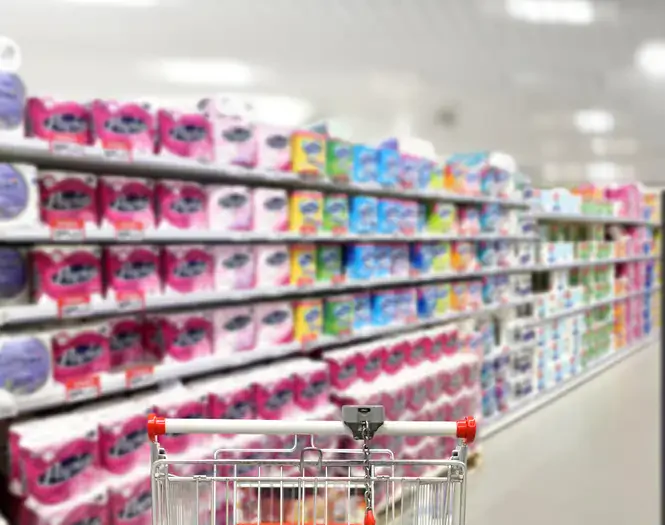
By Ian Hall, CEO, CCS McLays
In retail logistics, attention often focuses on high-value products and seasonal launches that drive sales. Yet the everyday essentials - bags, hangers, till rolls, cleaning supplies, and signage - are equally critical. These items are often overlooked until they fail to arrive, and when that happens, staff efficiency drops, store operations falter, and the customer experience suffers.
In today’s challenging economic climate, the pressure on that final leg of delivery - commonly known as the “final mile” - is greater than ever. A recent survey by the Confederation of British Industry (CBI) revealed that retailers in the UK recorded negative sales volumes for the thirteenth consecutive month in October 2025, with the balance of expected sales for November dropping to −39. This highlights the pressures retailers face and why the importance of ensuring reliability and efficiency in the final mile is greater than ever.
With that in mind, here are five key reasons the final mile matters for retail consumables:
1. Complexity peaks in the final mile
The last few steps into a store are where rules, restrictions and vulnerabilities multiply. Each city, mall or pedestrianised zone presents its own unique access challenges. Urban regulations - low-emission zones, congestion charges, dock-booking windows and curfews - are now the norm rather than the exception. In Milan, for example, only electric vehicles may enter certain zones. In Singapore, retailers face rigid dock-booking systems with penalties for missed windows. In medieval European towns like Bruges or Florence, delivery vans often cannot get close to the store at all, forcing goods to be wheeled in by trolley.
Navigating this complex patchwork demands deeply local insight, flexibility, and real-time routing. When delivering consumables - essential items for daily store operation - any mis-step can undermine the entire supply chain.
2. Small issues can create big consequences
Even seemingly mundane items such as till rolls, signage, or cleaning supplies are vital. If they don’t arrive, the impact is immediate: tills can’t register sales, signage confuses customers, or store openings are delayed because cleaning hasn’t been completed. These failures ripple through the business - staff efficiency drops, customer experience suffers, and brand reputation takes a hit.
In a retail environment already suffering from weak consumer demand, as illustrated by the CBI survey, the costs of final-mile failures are amplified.
3. Local knowledge enables global reliability
Many retail networks are global, but their success hinges on performance at the local level. A global supply chain is broken if the last step into a city centre store is blocked by local rules. The best consumables partners don’t just coordinate transport; they build networks of trusted local delivery operators who understand city-specific challenges: which streets are closed for parades, which towns require weekend permits, or which Middle Eastern malls demand dock bookings days or weeks in advance.
By embedding local intelligence into global logistics planning, risks are managed proactively - delays are anticipated, alternative routes planned, and local partners engaged early. This transforms the final mile from a headache into a differentiator.
4. Flexibility and foresight keep stores running
Even the best-planned final mile strategy can hit surprises: road closures, strikes, changed store access windows, or unexpected demand spikes. What differentiates a truly dependable partner is the ability to adapt in real time - rerouting vehicles, coordinating with local teams, or tweaking windows on the fly. In the world of consumables, responsiveness is critical: stores cannot pause operations because a small but essential item is missing.
With UK retail sales growth slowing in recent months due to consumers’ November budget fears, the cost of operational failure is high. Retailers are facing similar pressures globally: according to reports, China’s factory output growth slumped to an eight-month low in recent months, while retail sales also slowed sharply, and in the US and the euro area, the pace of retail sales has eased this year. Against this backdrop, final mile flexibility isn’t optional – it’s essential.
5. Sustainability and brand integrity start in the final mile
Consumers increasingly expect brands to demonstrate environmental responsibility in how goods are delivered. The final mile is ground zero for that expectation. Low-emission vehicles, optimised routes to reduce mileage, and recycling or closed-loop solutions for consumables such as garment hangers and bags are all part of a sustainable approach.
Beyond sustainability, the final mile is a key brand touchpoint. A store that is understaffed, missing receipt paper, or without signage erodes customer trust and damages the brand. In a market where volumes are falling and confidence is fragile, retailers cannot afford such failures.
Delivering the difference
Mastering the final mile for retail consumables is about more than moving goods from hub to store. It requires anticipating regulations before they bite, embedding local intelligence, staying agile in the face of change, and integrating sustainability as a core feature.
When executed well, it safeguards the brand and ensures smooth operations. When it fails, the consequences are visible and costly. Retailers that prioritise the final mile with a trusted consumables partner gain resilience, agility, and a competitive edge in an increasingly challenging market.



